- Home
- Dave Pelzer
A Man Named Dave Page 3
A Man Named Dave Read online
Page 3
“Yes, ma’am,” I automatically respond.
Mother’s face turns beet red as the muscles in her neck tighten. Her upper body begins to shake. I’m not sure, but I think Mother is having a violent seizure. I want to yell out, but I’m too scared. I stand in front of Mother like a helpless fool. I don’t know what to do.
After a few seconds the redness from her face disappears. She lets out a deep sigh. “I just don’t know anymore . . . if I’m coming or going. I don’t know . . . I didn’t mean for things to happen this way; no one did. You can’t blame me, I did my best . . .”
The sweetness in her voice fades. I want so badly to run and hug Mommy before she completely slips away, but, like always, I know in a few hours Mother won’t remember a single word of our conversation. I back away from the kitchen table and resume the position of address.
“Oh, Jesus!” Mother snaps. “Now look what you’ve done! I’ve got to drive my boys to school! Forget the dishes; you can finish them after school. And listen up: I don’t want to hear a peep from any of those nosy teachers today, so you keep that carcass of yours the hell out of trouble! You got me, mister?” Mother raises her voice to her usual evil tone.
“Yes, ma’am,” I mutter.
“Then get the hell out of my house! Run!” Mother bellows.
“What about lunch . . . ?” I ask.
“Too bad. You took my time, then I take your lousy sandwich. You’ll just have to go diggin’ for food today. Now get the hell out of here! Don’t make me get the broom! Now run!”
In a flash I race through Mother’s house. I can hear her evil laugh as I slam the front door shut before sprinting off to school.
Minutes later, after running to school at top speed, I stagger into the nurse’s office with my hands slapping on my knees. With every breath I take in, the muscles around my throat tighten. An enormous pressure from behind my eyes begins to build. I slap my knees as if that will somehow make air rush into my lungs. The school nurse spins around from behind her desk. My mind fumbles to yell, but I cannot form the words. But I try again. “C-a-n-’t b-r-e-a-t-h-e!” I finally sputter, pointing at my neck.
The nurse leaps up with lightning speed, grabs a brown bag, turns it upside down spilling its contents onto the floor, and kneels down in front of me. Through my tears I can see the terror in her eyes. I want to cry out, but I’m too scared. The nurse pulls on my hand, but I slap her away as I continue to pound my knees. The more I try to draw air into my lungs, the more the invisible bands tighten around my chest. “No!” the nurse shouts. “David, stop it! Don’t fight it! You’re hyperventilating!”
“Hipper ventle . . . ?” I gasp.
“Slow down. You’re going to be fine. I’m just going to put this bag over your—”
“Nooo! I can’t . . . won’t be able . . . to see. I . . . have to see!”
“Shh, I’m right here. Close your eyes and concentrate on the sound of my voice. Good. Now slow down. Take tiny puffs of air. Breathe through your nose. That’s it,” the nurse whispers in a soothing voice. With her I feel safe. “That’s much better; tiny breaths. Reach out, take my hand. I’m right here. I’m not going to leave you. You’re going to be fine.”
I obey the nurse and shut my eyes. As the nurse places the bag over my face, I can instantly feel warm air circulate. It feels good, but after a few breaths my exhaled air becomes too hot. My legs begin to lock up. By accident I jerk the nurse’s hand.
“Shh. David, trust me, you’re fine. You’re doing better. Much better. That’s it, slow down. See? Now, lean your head back and relax.”
As I tilt my head backward, a rush of air escapes from my mouth. The pressure is so intense that I fight to keep myself from throwing up. I rip the bag from my face before my legs buckle, and I fall to the floor gasping for more air. Within seconds the bands around my chest begin to ease.
After a few minutes, the fire from inside my neck begins to cool. “Here,” the nurse says, holding a glass of ice cubes in front of me, “take one of these to suck on.”
I try to pick up a piece of ice, but my trembling fingers cannot grasp the cube. Without a second thought the nurse reaches into the glass and picks one out. “Open up.”
I lower my head, trying to hide. The moment I do, the searing pain returns. “David, what’s wrong? Come on now, open up,” she instructs in a more commanding tone. I close my eyes. I know what’s coming next: questions. I’d give anything to avoid another round of questions. All they do is make everyone at school upset and somehow Mother always finds out. Whenever the principal has called Mother, the staff at school would see the results the next day. As I continue to avoid the nurse’s eyes, I fantasize about crawling into a corner so I can disappear.
I slowly open my eyes when I feel the nurse lift my head with her fingers. Her face turns chalky white.
“Oh . . . my . . . Lord! What in heaven’s name happened to your neck?” the nurse exclaims as she peers from side to side.
I wring my hands, hoping she’ll drop the subject. “Please!” I wheeze. “Let it go.”
“The side of your Adam’s apple is so swollen!” The nurse flies away to snatch a tongue depressor from one of her glass jars. “Let’s have a look. Open up.” I let out a raspy sigh before obeying. “I need you to open just a little bit wider. Can you do that for me?” she asks gently.
“Can’t,” I whimper. “Hurts too much.”
At last the nurse allows me to close my mouth. Again, I try to avoid her stare. I bury my trembling fingers in my lap. She shakes her head before standing up and grabbing her clipboard. Every school day, for over a year, the nurse has inspected my body from head to toe before documenting her examinations. Now she mutters to herself as she scribbles her latest findings. Kneeling back down, she delicately massages the palms of my hands. I bite my lip in anticipation. The nurse stares into my eyes as if not knowing what to say. Now I’m really scared.
“I’m sorry, David,” she says as tears seep from behind her glasses. “I was wrong. You weren’t hyperventilating. Your, ah, your larynx . . . your epiglottis is swollen and your trachea is inflamed. What I’m saying is: this is why you are having trouble breathing. The opening to your throat was cutting off your flow of oxygen. Do you understand?”
I take a moment to visualize in my mind the nurse’s meaning. I don’t want her to think I’m stupid.
“When did this happen?” she asks.
I look away from the nurse’s gaze and stare at my shoes. “I was, uhm . . .” I fumble for the exact wording to Mother’s cover story, but my brain still feels trapped in a fog bank. “I was . . . I fell . . . I fell down the stairs.”
“David?” she replies, raising her eyebrows.
“It’s my fault!” I snap back. “I was wrestling and I got out of control and my brothers—”
“Poppycock!” the nurse interrupts. “You mean your mother knew of your condition . . . and she still made you run to school? Do you realize what might have happened to you? For goodness sakes, you could have . . .”
“Uhm, no, ma’am. Please, I’m better now. Really, I’m fine,” I say as softly and as quickly as I can, before the burning sensation returns. “Please! It’s not her fault! Let it go!”
The nurse lifts her glasses to wipe away her tears. “No! Not this time! I won’t let it go. I’ve had enough. This is the last straw. This has to be reported to the principal. Something has got to be done.” She stands up and slaps her clipboard against her leg as she marches for the door.
“No! Pleeze!” I beg. “You don’t understand! If you tell, she’ll—”
“She’ll what?” The nurse spins around. “Tell me, David, tell me so I have something, anything, to go on! I know it’s her—we know it’s her—but you’ve got to help us, to help you,” she pleads.
In an effort to relieve the pain I stare up at the ceiling. I wring my hands and concentrate on inhaling tiny puffs of air through my nose. From the corner of my eye I can see the nurse still standing by the
door. I slowly turn my head toward her. Tears run down my cheeks. “I, ah . . . I can’t.”
“Why? In heaven’s name, why do you protect her? What are you waiting for?” she barks in a rattling voice. “Something has to be done!”
The nurse’s words pound through my skull. I bite down on my lip until it bleeds. My arms begin to shake. “Dammit!” I blurt out in a squeaky voice. “Don’t you understand? There’s nothing, nothing, that anyone can do! It’s my fault! It’s always my fault. ‘Boy’ this, ‘It’ that, blah, blah, blah. Every day is a repeat of the day before. Even you,” I state with my finger thrust at the nurse, “every day I come in, take off my clothes, you look me over, you ask me about this, about that . . . for what? Nothing changes, and nothing ever will!” The band around my throat begins to tighten, but I don’t care. I can no longer control my flood of emotions. “Miss Moss tried—”
“Miss Moss?” the nurse asks.
“My, ah, my second-grade teacher. She tried . . . she tried to help and she’s gone. . . .”
“David?” the nurse says in a disbelieving tone.
I bury my face in my hands. “Father tried . . . and he’s gone, too. You have to understand: everything I am, everything I do, is bad. Everything’s wrong. If you get too close, she’ll . . . she’ll deal with you, too! No one wins!” I cry. “No one wins against The Mother!” I bend over in a coughing fit. Whatever energy I had drains away. I lean against the nurse’s examination bed. I fight to slow down my breathing. “I, ah . . . when I sat at the bottom of the garage stairs and they’d watch TV or eat dinner, I tried to figure things out, to understand why.” I shake my head clear of the countless hours spent in the garage. “You know the one thing I wanted the most?”
Her mouth hangs open. She’s never seen me like this before. “No,” she answers.
“I just wanted to be real. To be a real kid—with clothes and stuff. I don’t mean just toys, but to be outside. I always wanted to play on the jungle gym after school. I’d really like to do that.” For a moment I smile at my fantasy. “But I know I won’t be able to. Never. I have to run to The House fast or I get into trouble. Sometimes, on really sunny days, as I’m running from school, I cheat and stop to watch the kids play.”
My vision becomes blurred as I rattle off my deepest secrets to the nurse. Because I am not allowed to speak at Mother’s house and have no friends at school, I have no one to express my feelings to. “Other times in the garage, at night, when I lay on my cot, I’d think hard to figure out what I could do. I mean, to fix things between Mother and me, to make things better. I wanted to know why, how, things became so bad. I really thought if I tried hard enough—if I prayed with all my spirit—I’d find my answers. They never came.
“I . . . I, ah, tri—tried,” I stutter. I’m holding back my tears. “I spent so much time . . . I, ah, I just . . . I just wanted to know why. That’s all. Why me, why us? I just wanted to know. Why?” I stare into the nurse’s eyes. “I don’t care anymore! I just want to go to sleep! I’m tired of everything! The games, the secrets, the lies, hoping one day Mother will wake up and everything will be better again! I can’t take it anymore!
“If you could just let me sleep, for just a while, please?” I beg.
She shakes her head. “This has to end, David. Look at you. You’re—”
“It’s okay,” I interrupt in a calm voice. “I’m not . . . when I’m at school, I’m not afraid. Just promise me you won’t tell. Not today, please?”
“David, you know I can’t do that,” the nurse replies in a flat tone.
“If you . . . if you tell,” I pant, “then you know what will happen. Please, let it go!”
She nods her head in agreement. “Just for today.”
“Promise?”
“Promise.” She takes my hand and leads me to the small bed in the corner of the room.
“Cross your heart and hope to die?” I ask, making an X mark on my chest with my finger.
“Cross my heart,” she repeats in a choked-up voice. She covers me with a thick wool blanket.
“. . . And hope to die?” I repeat. The nurse’s lips part with a smile as she gently strokes my matted hair. I take her hands and cup them around mine. “. . . And hope to die?”
The nurse gives my hands a gentle squeeze. “And hope to die.”
In the deepest part of my soul, I feel at peace. I am no longer afraid. I am ready to die.
CHAPTER
2
FLY AWAY
AUGUST 24, 1979
Thick, sticky sweat coated every pore of my skin. My stomach seized with fear. My fingers seemed fused together as they clawed the armrest. I wanted to shut my eyes, but the combination of exhilaration, fascination, and terror inside me kept them glued to the small Plexiglas window. I studied every feature of the Bay Area—my home for the last eighteen years.
“I’m flying?” I asked, to my own amazement.
My body slid from my seat, and I thought for sure I’d fall out of the plane as the Boeing 727 made a sudden sharp roll to the right. To help contain my fear, I forced my eyes shut. I’m okay. I’m all right. I’m fine. My God, I can’t believe it! I’m flying! I’m actually flying! I could feel myself drifting off. Because of the excitement of finally enlisting in the U.S. Air Force, saying good-bye to my foster parents, and struggling with my past, I had not slept in days. As the roar of the jet’s engines began to fade, I started to unwind. The more my tension disappeared, the more I began to think of how far I had come.
As a child surviving in the garage of Mother’s house, I had never dreamed of making it out alive. Somehow, I had known Mother was close to killing me, and yet I did not care. I had given up all hope. Yet on March 5, 1973, the day after Mother had thrown me down the garage stairs, my teachers called the police, who immediately placed me into protective custody. I was free. As elated as I was, I sensed that my freedom was a hollow victory. At the county’s court proceedings, I felt that Mother had given me away. I felt as if I was not good enough for her. When my angel of mercy—my social worker, Ms. Gold—informed me that I was never to have any contact with Mother or her children ever again, I was crushed.
It was then that I became obsessed with finding answers to my past. Even though I was still terrified of Mother, who wanted nothing to do with me, I still struggled to prove that I was worthy of her love and worthy enough to be a member of her family.
As a foster child, I soon learned that I knew absolutely nothing about living in the real world. My former life as Mother’s prisoner had been dominated by elemental needs of survival. But after my rescue I felt like a toddler—learning and growing by leaps and bounds. The simplest things taught to preschool children became major obstacles for me. Because I had spent years in the garage with my head bent backward in a POW position, I developed very bad posture. As a foster child, I had to learn to focus and walk upright. Whenever I became nervous, I stuttered or slurred every word. It would take me forever to complete one simple sentence. My foster mother, Mrs. Turnbough, spent hours with me every day after school, teaching me phonics and helping me to imagine my words flowing from my mouth, like water cascading over a fall. Mrs. Turnbough’s valiant efforts were perhaps her undoing. Within a few months, I was driving my foster parents up the wall with all I had to say. They had all they could do to shut me up. I wanted to show off my new form of communication to everyone, every minute. But my mouth soon became my Achilles’ heel. Because I was so skinny and awkward, I became easy prey for others, and my only form of defense was my mouth. Whenever I felt backed in a corner, words of intense anger and hatred seemed to erupt before I could analyze what I was saying or why.
The only way I felt I could make friends was stealing for acceptance or doing whatever else I could to gain recognition. I knew that what I was doing was completely wrong, but after years of being an outcast and totally isolated, the need to fit in was too powerful to resist. My foster parents struggled to keep me on the straight and narrow, and teach me the
seriousness of my decisions.
On the lighter side, they were dismayed at my naivete and ignorance. The first few times I took a bath, I filled the tub to the rim before stepping into it, causing water to spill over the sides. I would then squeeze every drop I could from what I thought was “fancy-smelling bubble bath” into the tub, then stir the water like a whirlpool trying to form as much lather as possible. As much as my foster parents laughed at my water frolics, my foster sisters were not amused and hid their bottles of Vidal Sassoon in their bedrooms. Up until then I had never heard of the word shampoo.
I thought that in order to survive, I had to work. Early on as a foster child, it was drummed into me that foster kids—labeled as “F-kids”—never amounted to anything, never graduated high school, let alone go on to college. I also discovered that by the time I turned eighteen years old, I would no longer be a ward of the court—a minor that was provided for by the county—and since I didn’t have parents to rely on, I would be all alone. The closer I came to reaching adulthood, the more I became terrified of being broke and homeless. Deep down I feared I would not be strong enough to make it on my own. As a frightened child living in my mother’s garage, one of the promises I had made was that if I ever escaped, I would always have enough money to eat. So, as a young teenager, I abandoned my Lego and Erector sets and my Hot Wheels toy cars and focused on earning a living. By the age of fifteen I was shining shoes. I lied about my age to get work as a busboy. I did whatever I could to put in at least forty hours a week. As a freshman in high school, I slaved six days a week to put in over sixty hours. I did anything I could to squeeze in an extra hour a week to earn an additional $2.65. Only after I’d show up to school and collapse on top of my desk and get sick from total exhaustion did I begin to slack off. On one level, thinking that I was ahead of the game, I was proud, almost to the point of being cocky. But on the inside I felt hollow and lonely. As other boys my age were dating beautiful girls with short dresses and fancy makeup, driving their parents’ cars and whining about their ten-hour work weeks, I became increasingly jealous of their good fortune.

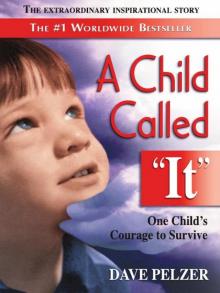 A Child Called It: One Child's Courage to Survive
A Child Called It: One Child's Courage to Survive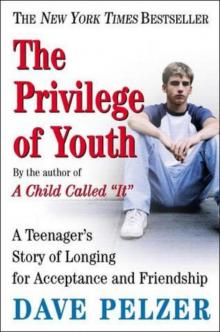 The Privilege of Youth: A Teenager's Story
The Privilege of Youth: A Teenager's Story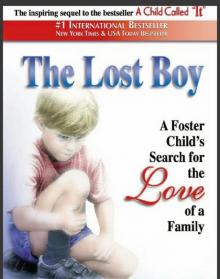 The Lost Boy: A Foster Child's Search for the Love of a Family
The Lost Boy: A Foster Child's Search for the Love of a Family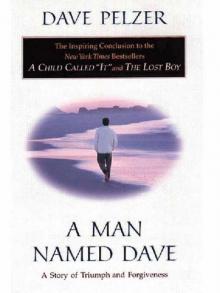 A Man Named Dave
A Man Named Dave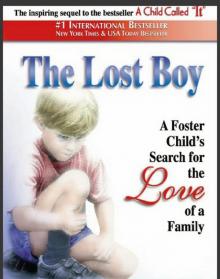 The Lost Boy
The Lost Boy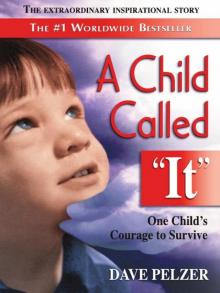 A Child Called It
A Child Called It